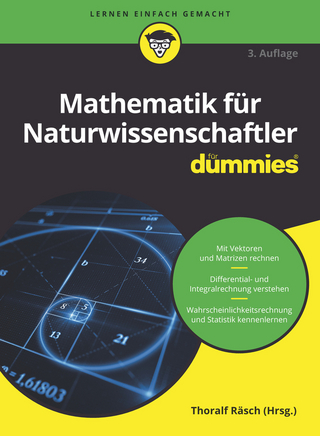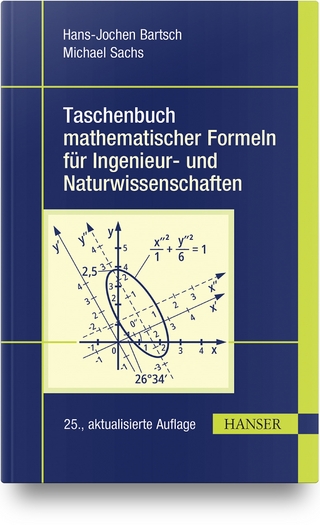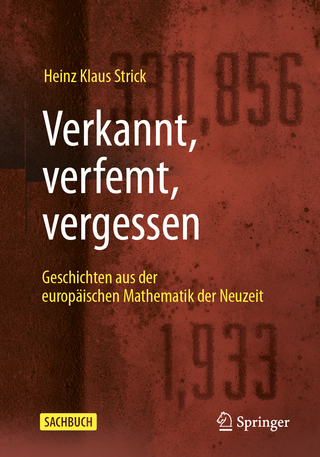
Incompleteness for Higher-Order Arithmetic
An Example Based on Harrington’s Principle
Seiten
2019
|
1st ed. 2019
Springer Verlag, Singapore
978-981-13-9948-0 (ISBN)
Springer Verlag, Singapore
978-981-13-9948-0 (ISBN)
Gödel's true-but-unprovable sentence from the first incompleteness theorem is purely logical in nature, i.e. not mathematically natural or interesting. An interesting problem is to find mathematically natural and interesting statements that are similarly unprovable. A lot of research has since been done in this direction, most notably by Harvey Friedman. A lot of examples of concrete incompleteness with real mathematical content have been found to date. This brief contributes to Harvey Friedman's research program on concrete incompleteness for higher-order arithmetic and gives a specific example of concrete mathematical theorems which is expressible in second-order arithmetic but the minimal system in higher-order arithmetic to prove it is fourth-order arithmetic.
This book first examines the following foundational question: are all theorems in classic mathematics expressible in second-order arithmetic provable in second-order arithmetic? The author gives a counterexample for this question and isolates this counterexample from the Martin-Harrington Theorem in set theory. It shows that the statement “Harrington's principle implies zero sharp" is not provable in second-order arithmetic. This book further examines what is the minimal system in higher-order arithmetic to prove the theorem “Harrington's principle implies zero sharp" and shows that it is neither provable in second-order arithmetic or third-order arithmetic, but provable in fourth-order arithmetic. The book also examines the large cardinal strength of Harrington's principle and its strengthening over second-order arithmetic and third-order arithmetic.
This book first examines the following foundational question: are all theorems in classic mathematics expressible in second-order arithmetic provable in second-order arithmetic? The author gives a counterexample for this question and isolates this counterexample from the Martin-Harrington Theorem in set theory. It shows that the statement “Harrington's principle implies zero sharp" is not provable in second-order arithmetic. This book further examines what is the minimal system in higher-order arithmetic to prove the theorem “Harrington's principle implies zero sharp" and shows that it is neither provable in second-order arithmetic or third-order arithmetic, but provable in fourth-order arithmetic. The book also examines the large cardinal strength of Harrington's principle and its strengthening over second-order arithmetic and third-order arithmetic.
Introduction and Preliminary.- A minimal system.- The Boldface Martin-Harrington Theorem in Z2.- Strengthenings of Harrington’s Principle.- Forcing a model of Harrington’s Principle without reshaping.- The strong reflecting property for L-cardinals.
| Erscheinungsdatum | 13.09.2019 |
|---|---|
| Reihe/Serie | SpringerBriefs in Mathematics |
| Zusatzinfo | 1 Illustrations, black and white; XIV, 122 p. 1 illus. |
| Verlagsort | Singapore |
| Sprache | englisch |
| Maße | 155 x 235 mm |
| Themenwelt | Mathematik / Informatik ► Mathematik ► Allgemeines / Lexika |
| Mathematik / Informatik ► Mathematik ► Logik / Mengenlehre | |
| Schlagworte | Harrington's Principle • higher order arithmetic • incompleteness • L-cardinals • Martin-Harrington Theorem • set theory |
| ISBN-10 | 981-13-9948-4 / 9811399484 |
| ISBN-13 | 978-981-13-9948-0 / 9789811399480 |
| Zustand | Neuware |
| Informationen gemäß Produktsicherheitsverordnung (GPSR) | |
| Haben Sie eine Frage zum Produkt? |
Mehr entdecken
aus dem Bereich
aus dem Bereich
Buch | Hardcover (2023)
Hanser, Carl (Verlag)
CHF 41,95
Geschichten aus der europäischen Mathematik der Neuzeit
Buch | Softcover (2024)
Springer (Verlag)
CHF 41,95


